The key to leveling-up your business could lie in hiring a professional coach to help get you on track. By Jennifer Paulson

If you’ve played any sports, you’ve no doubt benefitted from the insight and motivation provided by your coach. You might’ve even developed a coaching relationship with a fellow NRHA Professional to help you when you’re stuck training a horse or putting the final polish on before a major event. In either case, your coach helps you find ways to develop your skills, find a framework to meet your goals, and cheers you on as you progress (and picks you up when you stumble).
But have you ever considered enlisting the help of a coach to level-up your business?
Katie Hollingsworth is a familiar face around NRHA, having provided her coaching services to NRHyA delegates and officers and to NRHA employees. She’s also married to a rodeo coach at Oklahoma State University, and is a barrel racer herself. Most notably (and important to you as a business owner) is Hollingsworth is a performance and leadership development coach at Krave Coaching and Consulting.
Here, Hollingsworth details how a professional coach can be the best investment you make in your business and in yourself in these articles:
Part 2: Getting Started and Finding a Coach
Part 4: Put Your Mind to It and Stay on Track
SMART Goals
If you’ve done any goal-setting, or helped your customers set their riding goals, you’ve likely heard the phrase “SMART goals,” which are Specific, Measurable, Achievable, Realistic, and Timely.
“It’s fine to have a huge, overarching goal,” Hollingsworth explains. “but you must have a goal for each step along the way. Break down your big goal into the SMART components, and then identify obstacles that could get in your way and how you’ll hold yourself accountable throughout the process.”
Accountability is key! It can come in the form of an accountability partner (your spouse, a peer, or a friend who checks in on you to ensure that you’re sticking to your goals) and your coach, but more importantly, via self check-ins with your actions and your values.
“Goal-setting and the work toward your goals are very personal processes,” Hollingsworth says. “Setting goals and processes that align with your personal values is critical. Don’t set goals about what you think you’re supposed to be. You’ll quit. Connecting to your core values will keep you on track and help you work toward achievement.”
Once you identify your core values, begin with steps toward your goal that you can take immediately. Find ways to stay connected to your goals every single day, and recognize those achievements.“Confidence comes from recognizing success,” Hollingsworth says. “People say they want to stay humble and hungry, but acknowledging what you’ve done is what keeps you going. For example, think about writing a done list instead of a to-do list. A to-do list is constantly growing and can wear you down. A done list inspires confidence.”



